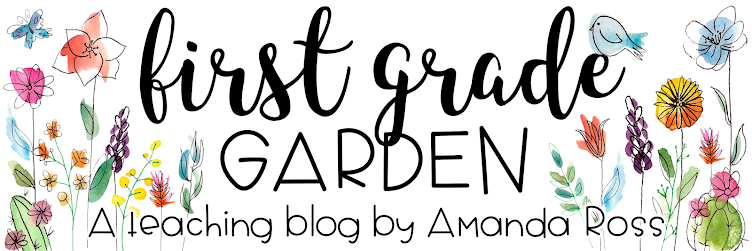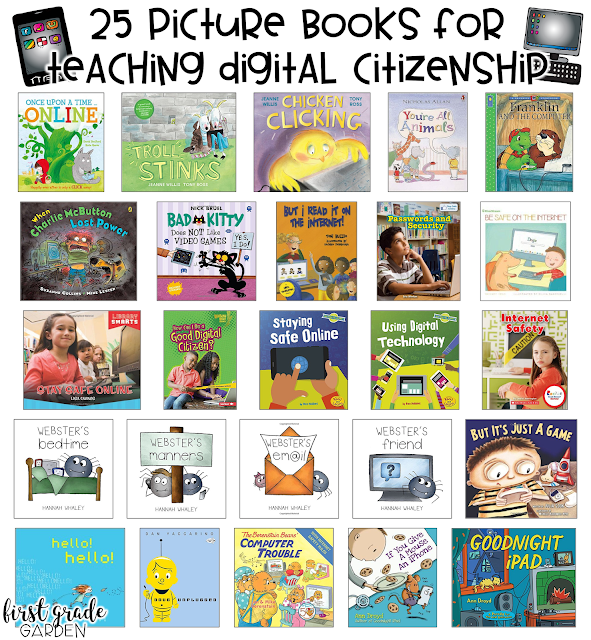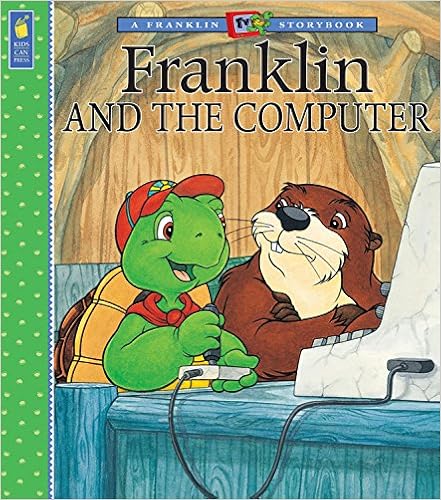Technology is become more and more prevalent in our schools and our daily life. It's important as teachers (and parents) that we talk to our students and children about online safety, manners, and how to regulate our technology use. Her are some good, old-fashioned picture books to help you teach some of these concepts to young children. (This post contains affiliate links to Amazon.ca.)
Books for Teaching About Technology Addiction
Franklin becomes addicted to a computer game and stops hanging out with his friends or playing outside.
When the power goes out, Charlie needs to learn how to have fun without his electronics.
Bad Kitty has to take a break from his favourite video game and finds out there are other fun things to do instead.
Webster's Bedtime by Hannah Whaley
Webster the spider learns that all his devices need to go to sleep at nighttime, just like he does!
Books About Being a Good Digital Citizen
Webster the spider learns that all his devices need to go to sleep at nighttime, just like he does!
Jasper is addicted to his video games and has to learn to enjoy them, but have balance in his life.
Lydia teaches her family about all the fun they are missing when they are stuck on all their gadgets.
Doug the robot experiences everything through downloading information from a plug. One day he decides to go outside and experience everything first hand instead!
The Bear family becomes addicted to a computer that Papa Bear brings home, so he has to figure out a solution to get the family off the computer!
A parody of Laura Numeroff's books, a mouse becomes addicted to an iPhone and doesn't realize what is going on around him.
A parody of the book "Goodnight Moon", we realize that our life s not so quiet anymore with all the buzzing and beeping electronics around us.
The school librarian helps the students learn that not everything they read on the internet is true and helps the students learn to figure out what to believe or not.
A non-fiction book that covers topics such as staying safe, showing respect, and using technology wisely.
A non-fiction book that looks at what computers are used for, how to store information and search online, and playing games online.
Webster the spider learns that you need to use manners with technology. He learns there are appropriate times to use devices and times when you should put your devices away.
Webster the spider learns about email etiquette and how fast an email can travel around. When he sends a silly picture of his sister, he realizes that he can't get that email back and should think carefully about the emails he sends.
Books About Online Safety
Some of the fairy tale characters learn some lessons about online safety when a laptop suddenly arrives in Fairy Tale Land.
Chicken uses the farmer's computer to do some online shopping and then goes off to meet a friend she met online. Chicken learns a lesson when she does not tell her parents where she is going and the friend is not quite what she expected...
Elephant thinks all the students at his new school are weird and not like him, so he meets a friend online that looks the same and has the same interests as him. He gets a big surprise when he finally meets his new friend.
A non-fiction book that teaches about passwords and keeping your information safe online. Also talks about mindfulness when posting things online.
Aidan teaches his puppy how to be safe online.
Another non-fiction book about online safety. Discusses smart online searching, guarding your personal information, and how to make friends online safely.
An easy reader non-fiction book about ways to be safe online.
A Rookie Read-About Safety non-fiction book about being safe on the internet.
Webster the spider learns about telling the truth online and that sometimes the people you are talking to online are not who they seem...
Books About Cyberbullying
When Billy Goat finds the farmer's cell phone, he and his friend start sending nasty messages to the troll under the bridge. They learn a valuable lesson about cyberbullying when they actually meet the troll!
I hope you enjoy some of these books and that they help you have some good conversations with your students about how to be safe and respectful digital citizens.

























